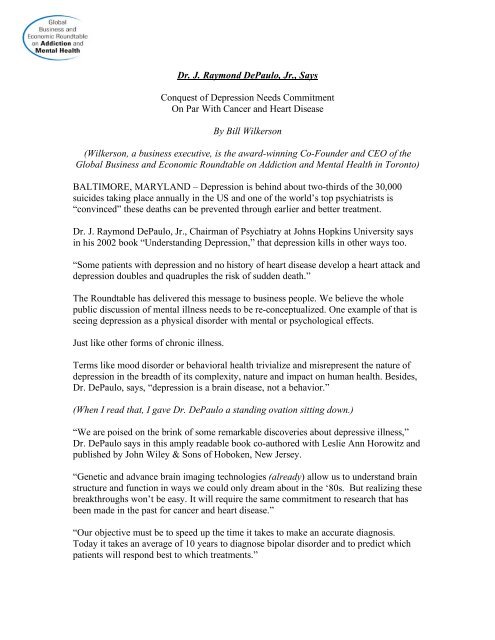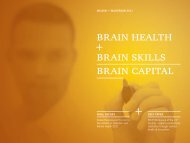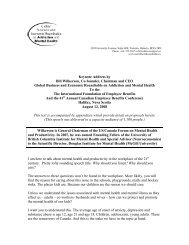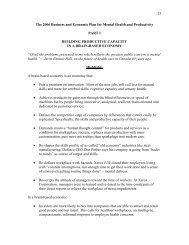Dr. J. Raymond DePaulo, Jr., Says Conquest of Depression Needs ...
Dr. J. Raymond DePaulo, Jr., Says Conquest of Depression Needs ...
Dr. J. Raymond DePaulo, Jr., Says Conquest of Depression Needs ...
You also want an ePaper? Increase the reach of your titles
YUMPU automatically turns print PDFs into web optimized ePapers that Google loves.
<strong>Dr</strong>. J. <strong>Raymond</strong> <strong>DePaulo</strong>, <strong>Jr</strong>., <strong>Says</strong><br />
<strong>Conquest</strong> <strong>of</strong> <strong>Depression</strong> <strong>Needs</strong> Commitment<br />
On Par With Cancer and Heart Disease<br />
By Bill Wilkerson<br />
(Wilkerson, a business executive, is the award-winning Co-Founder and CEO <strong>of</strong> the<br />
Global Business and Economic Roundtable on Addiction and Mental Health in Toronto)<br />
BALTIMORE, MARYLAND – <strong>Depression</strong> is behind about two-thirds <strong>of</strong> the 30,000<br />
suicides taking place annually in the US and one <strong>of</strong> the world’s top psychiatrists is<br />
“convinced” these deaths can be prevented through earlier and better treatment.<br />
<strong>Dr</strong>. J. <strong>Raymond</strong> <strong>DePaulo</strong>, <strong>Jr</strong>., Chairman <strong>of</strong> Psychiatry at Johns Hopkins University says<br />
in his 2002 book “Understanding <strong>Depression</strong>,” that depression kills in other ways too.<br />
“Some patients with depression and no history <strong>of</strong> heart disease develop a heart attack and<br />
depression doubles and quadruples the risk <strong>of</strong> sudden death.”<br />
The Roundtable has delivered this message to business people. We believe the whole<br />
public discussion <strong>of</strong> mental illness needs to be re-conceptualized. One example <strong>of</strong> that is<br />
seeing depression as a physical disorder with mental or psychological effects.<br />
Just like other forms <strong>of</strong> chronic illness.<br />
Terms like mood disorder or behavioral health trivialize and misrepresent the nature <strong>of</strong><br />
depression in the breadth <strong>of</strong> its complexity, nature and impact on human health. Besides,<br />
<strong>Dr</strong>. <strong>DePaulo</strong>, says, “depression is a brain disease, not a behavior.”<br />
(When I read that, I gave <strong>Dr</strong>. <strong>DePaulo</strong> a standing ovation sitting down.)<br />
“We are poised on the brink <strong>of</strong> some remarkable discoveries about depressive illness,”<br />
<strong>Dr</strong>. <strong>DePaulo</strong> says in this amply readable book co-authored with Leslie Ann Horowitz and<br />
published by John Wiley & Sons <strong>of</strong> Hoboken, New Jersey.<br />
“Genetic and advance brain imaging technologies (already) allow us to understand brain<br />
structure and function in ways we could only dream about in the ‘80s. But realizing these<br />
breakthroughs won’t be easy. It will require the same commitment to research that has<br />
been made in the past for cancer and heart disease.”<br />
“Our objective must be to speed up the time it takes to make an accurate diagnosis.<br />
Today it takes an average <strong>of</strong> 10 years to diagnose bipolar disorder and to predict which<br />
patients will respond best to which treatments.”
<strong>Dr</strong>. <strong>DePaulo</strong> answers several questions on the minds <strong>of</strong> a lot <strong>of</strong> people including those in<br />
the insurance business.<br />
Q<br />
Is the diagnosis <strong>of</strong> depression too “subjective” to be reliable?<br />
JRD We have specific criteria and reliable markers to diagnose depression and<br />
while we don’t have lab tests, blood tests, X-rays or CAT scans, MRIs helps determine if<br />
something like a stroke or low-functioning thyroid is the cause.<br />
Q<br />
Are there visible, physical signs <strong>of</strong> depression?<br />
JRD One patient (I see) developed stiffness, slowness and tremors that would appear<br />
only when he was depressed. About 90% <strong>of</strong> patients with clear-cut, treatable<br />
depression complain <strong>of</strong> fatigue.<br />
Q<br />
Does stress trigger depression?<br />
JRD Stressful life events can lead to depression in some people and simply<br />
discouragement in others. In a medical sense, stress is the nervous system’s response to<br />
intensively unpleasant conditions.<br />
<strong>Dr</strong>. <strong>DePaulo</strong> adds: “It would be a major breakthrough if we understood how external<br />
events (environment we live and work in) interact with the internal functioning <strong>of</strong> the<br />
brain.”<br />
“We need to know which ‘stresses’ will produce depression. Research is being done to<br />
discover why stress affects the brain and how repeated stress affects those parts <strong>of</strong> the<br />
brain that are involved in depression.”<br />
“It seems pretty clear that repeated severe stresses and persistently elevated stress<br />
hormone levels compromise the functions <strong>of</strong> brain cells in some critical brain regions<br />
possibly linked to depressive illness.”<br />
In “Understanding <strong>Depression</strong>,” <strong>Dr</strong>. <strong>DePaulo</strong> describes one <strong>of</strong> the most formidable<br />
barriers to getting treatment: “Depressed patients generally believe they cannot be<br />
diagnosed or treated and are <strong>of</strong>ten convinced they will never recover from what ails<br />
them.”<br />
That kind <strong>of</strong> misunderstanding depression can be tragic. And fatal.<br />
-30-<br />
Sidebar Article






